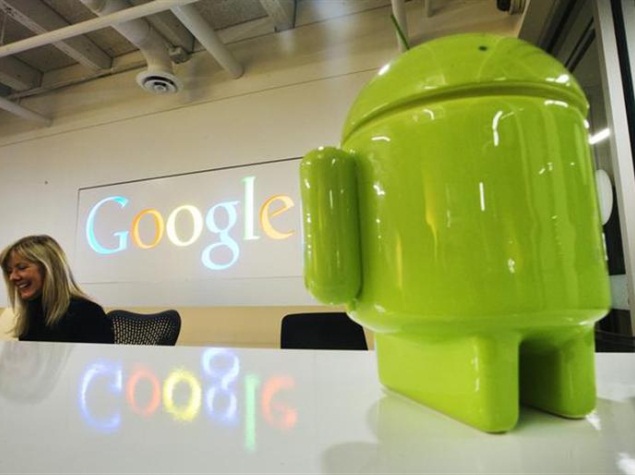- Home
- Mobiles
- Mobiles News
- Google Reportedly Wants More of Its Apps Preinstalled on Android Devices
Google Reportedly Wants More of Its Apps Preinstalled on Android Devices

The Information viewed the new documents and claims that the Mountain View giant has been adding requirements for various manufacturers including Samsung, Huawei, and HTC among others. Notably, many OEMs customise Android by putting their skins on top, and preloading their apps, which has often been criticised as 'bloatware'. It's possible Google sees this as coming in the way of consumers enjoying a pure Android experience.
Some of the key provisions noted by Information (full article behind a paywall) for Android OEM partners include, "Increasing the number of Google apps that must be pre-installed on the device to as many as 20, placing more Google apps on the home screen or in a prominent icon folder and making Google Search more prominent."
According to the leaked updated contract, Google wants its partners to put the Google Play icon alongside a Google icon including 13 of its popular apps such as Chrome, Google Maps, Google Drive, YouTube, and Gmail, among others on the default home screen. The new contract reportedly also stressed OEM partners to follow Google's guidelines about hotwords for voice-enabled searches and virtual assistants.
Amir Efrati of The Information further notes (via Business Insider) that Google's partners are claiming the company has been "tightening the screws" on Android contracts, also known as Mobile Application Distribution Agreements (MADA).
(Also see: Quarterly Smartphone Shipments Top 300 Million; Android Extends Lead: IDC)
Google has been boasting the 'openness' of its Android operating system ever since its launch, however, purported leaked confidential document do point that the company wants more control over Android.
A similar leaked confidential document back in February had revealed strict guidelines that the search engine giant required HTC to follow. However, the leaked document in question was three years old.
Reports have been tipping that CyanogenMod, a popular forked version of Google's Android operating system was reportedly being eyed by several major companies including Amazon, Microsoft, Samsung and Yahoo for a partnership or acquisition.
(Also see: Samsung-Google deal: What it means for Android, alternate mobile platforms, and Apple)
Google, in an attempt to push stock Android OS in budget segment, even tied up with three Indian handset makers to launch the first batch of Android One smartphones in India priced attractively. The Android One smartphones offer stock Android experience and regular software updates.
Lately, Samsung, Google's most prominent partners, has been focusing more on Tizen, a Samsung-developed operating system aimed at breaking away from Google's Android system. The South Korean giant also announced its first Tizen smartphone, the Samsung Z earlier this year, with the phone expected to be launched in India soon.
Catch the latest from the Consumer Electronics Show on Gadgets 360, at our CES 2026 hub.
Related Stories
- Samsung Galaxy Unpacked 2025
- ChatGPT
- Redmi Note 14 Pro+
- iPhone 16
- Apple Vision Pro
- Oneplus 12
- OnePlus Nord CE 3 Lite 5G
- iPhone 13
- Xiaomi 14 Pro
- Oppo Find N3
- Tecno Spark Go (2023)
- Realme V30
- Best Phones Under 25000
- Samsung Galaxy S24 Series
- Cryptocurrency
- iQoo 12
- Samsung Galaxy S24 Ultra
- Giottus
- Samsung Galaxy Z Flip 5
- Apple 'Scary Fast'
- Housefull 5
- GoPro Hero 12 Black Review
- Invincible Season 2
- JioGlass
- HD Ready TV
- Laptop Under 50000
- Smartwatch Under 10000
- Latest Mobile Phones
- Compare Phones
- Honor Magic 8 RSR Porsche Design
- Honor Magic 8 Pro Air
- Infinix Note Edge
- Lava Blaze Duo 3
- Tecno Spark Go 3
- iQOO Z11 Turbo
- OPPO A6c
- Samsung Galaxy A07 5G
- Lenovo Yoga Slim 7x (2025)
- Lenovo Yoga Slim 7a
- Lenovo Idea Tab Plus
- Realme Pad 3
- Moto Watch
- Garmin Quatix 8 Pro
- Haier H5E Series
- Acerpure Nitro Z Series 100-inch QLED TV
- Asus ROG Ally
- Nintendo Switch Lite
- Haier 1.6 Ton 5 Star Inverter Split AC (HSU19G-MZAID5BN-INV)
- Haier 1.6 Ton 5 Star Inverter Split AC (HSU19G-MZAIM5BN-INV)






![[Sponsored] Haier C90 OLED TV | Dolby Vision IQ, 144Hz OLED and Google TV in Action](https://www.gadgets360.com/static/mobile/images/spacer.png)









